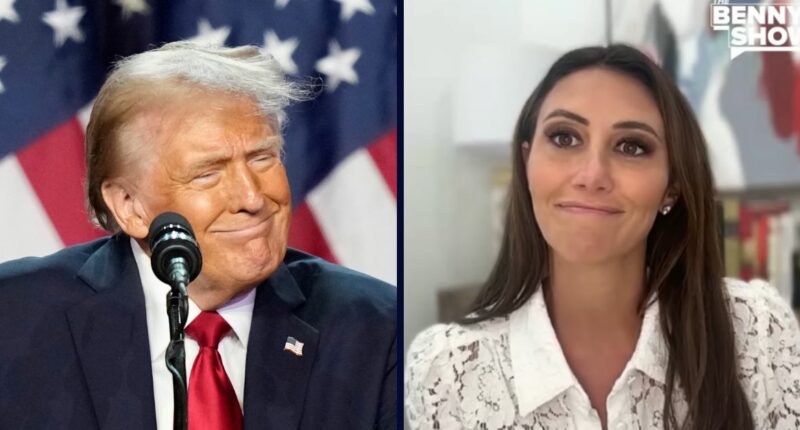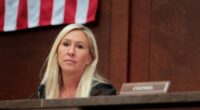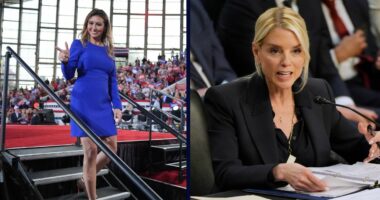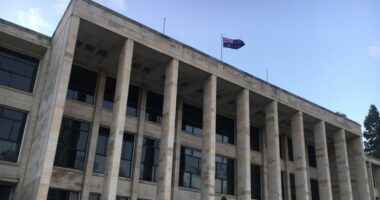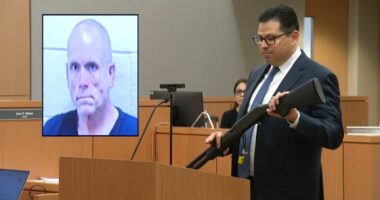Share this @internewscast.com
Left: Donald Trump addresses supporters at an election night gathering on Wednesday, November 6, 2024, in West Palm Beach, Florida. (AP Photo/Alex Brandon). Right: “Acting” U.S. Attorney Alina Habba discussing in an interview the federal judges’ decision against prolonging her tenure as New Jersey’s lead prosecutor (The Benny Show/YouTube).
A day following the DOJ’s strong defense of Alina Habba’s standing as the interim U.S. attorney in New Jersey, a group representing criminal defense lawyers in the state cautioned a federal judge that allowing the government’s “unconstitutional tactics” could foster more “trickery” and might pose risks to “essential” appeal cases.
The Association of Criminal Defense Lawyers of New Jersey (ACDL-NJ) submitted an amicus brief that plainly argued that U.S. Attorney General Pam Bondi “undertook an unprecedented action” to maintain Habba, former private lawyer for President Donald Trump, in her role.
According to Law&Crime, to continue Habba’s term as acting U.S. attorney, Trump withdrew her permanent position nomination and Habba stepped down right before her 120-day temporary term officially ended. This happened seemingly just before her deputy Desiree Leigh Grace was appointed by a federal court as U.S. attorney. Grace was subsequently dismissed from her deputy position, and Habba was reinstated under the Federal Vacancies Reform Act, effectively becoming the leading prosecutor once again.
Simultaneously, as a backup in case previous actions were deemed illegal, Bondi designated Habba as a “Special Attorney to the United States Attorney General” under 28 U.S. Code § 515, which oversees the appointment of special attorneys, granting her oversight over the entire office. To further eliminate any ambiguity regarding the court’s appointment of a successor to Habba, Trump also dismissed Grace from the U.S. attorney role assigned by the N.J. federal court.
This “convoluted method” and “novel order” from Bondi violates the Appointments Clause of the Constitution and sidestepped Congress, the brief said.
“The Appointments Clause grants Congress the exclusive authority to define the positions the President can fill and the method of their appointments. Regarding U.S. Attorneys, Congress has established detailed regulations specifying who may occupy the role in a permanent or temporary capacity, along with the duration,” the document stated. “It’s unthinkable that Congress intended to authorize the executive branch to bypass its meticulous statutes and appoint any President-desired individual in such a circumlocutory fashion.”
The amicus urged Chief U.S. District Judge Matthew Brann, a Middle District of Pennsylvania jurist sitting by designation in criminal cases of Habba challengers Julien Giraud Jr. and Julien Giraud III, to “scrupulously enforce the statutes Congress passed with respect to the awesome position of U.S. Attorney—a unique office that wields great responsibilities for securing justice and protecting civil liberties—by concluding that Ms. Habba is barred from serving as the acting U.S. Attorney in this or any other case in the District of New Jersey.”
The brief said that Bondi’s move “also undermines another statute,” 28 U.S.C. § 545 — one that John Sarcone, a second acting U.S. attorney the AG reinstalled by the same means, has been accused of flouting.
The statute in most cases requires that “[e]ach United States attorney shall reside in the district for which he is appointed,” but if the court accepts Bondi’s “Special Attorney” designation, then Habba wouldn’t have to abide by it, said the brief.
“The government points out that Ms. Habba’s role as a Special-Attorney-delegated-authority-to-act-as-though-she-were-a-U.S.-Attorney means that no one needs to comply with this residency requirement,” the filing continued. “But that is a bug, not a feature. The upshot of the government’s delegation theory is that the executive can ignore the congressionally enacted residency requirement whenever it sees fit. It also means that the Attorney General has effectively confirmed herself as the U.S. Attorney for the District of New Jersey.”
The filing tacked on a footnote wondering if the government was aware that Habba’s N.J. “attorney registration represents that her employer is ‘OUT OF STATE’ in Washington, DC.”
“If the Court does not put a stop to this unconstitutional maneuvering, further mischief could lie ahead,” the brief warned.
Casting Bondi’s “approach” as “imperial,” the amicus stated that the “dubious delegation theory” the AG relied on to override a federal court’s appointment of Habba’s successor, her former first assistant Grace, could end up harming the government when it comes time for “critical” appeals related to evidence.
“Federal law provides that the government can appeal adverse decisions involving the suppression or exclusion of evidence or requiring the government to return seized property only where ‘the United States attorney certifies to the district court that the appeal is not taken for purpose of delay and that the evidence is a substantial proof of a fact material in the proceeding,'” said the brief disputing Habba’s legitimacy as acting U.S. attorney.
If the government were so concerned about the administration of justice, then it wouldn’t contort itself to keep a political ally in a position that could jeopardize appeals in criminal cases, the amicus continued.
“Even the Attorney General’s say-so would not comply with the statute. If the government were truly committed to safeguarding the continued functioning of federal prosecutorial power in New Jersey and to avoid ‘crippling’ interruptions, it is hard to imagine that it would take a step that jeopardizes its ability to appeal adverse judicial decisions,” the filing said.
Brann previously allowed the ACDL-NJ to file its amicus brief and participate in oral arguments set to take place at 10 a.m. on Friday. Unfortunately, the judge’s chambers told Law&Crime there will not be a public access line to listen in on the arguments remotely, as the Girauds’ case is a criminal proceeding.
It won’t just be the Giraud defendants and their attorneys making arguments against Habba’s authority at the hearing. Brann has consolidated a second challenge, one brought by Cesar Pina — a fraud defendant who, unlike the Girauds, was indicted on Habba’s watch.
Recall that Brann, while still entertaining whether to effectively force Habba’s recusal in pending criminal cases, refused to dismiss the Girauds’ drug-trafficking indictment, rejecting the notion that Habba’s questionable authority to serve as N.J.’s top federal prosecutor “somehow retroactively taint[ed]” a criminal case brought by a different and Senate-confirmed U.S. attorney, Philip Sellinger.
The judge has allowed Pina, represented by attorneys Norm Eisen, Abbe Lowell and Gerald Krovatin, to raise his dismissal arguments at the hearing.
